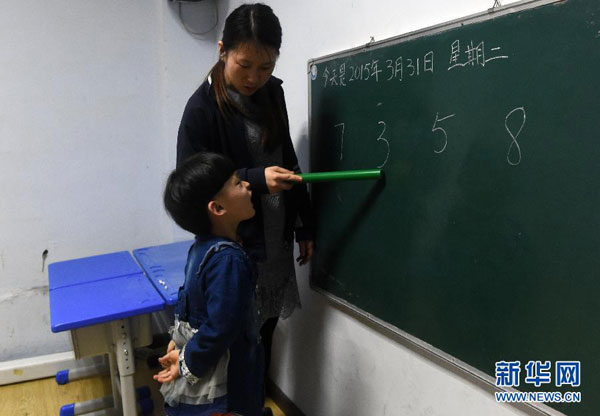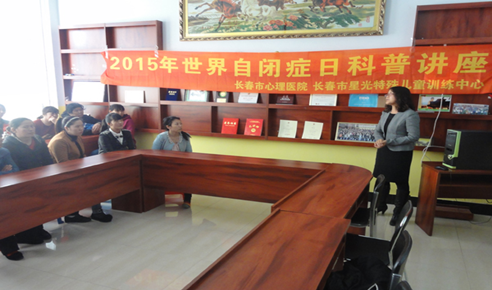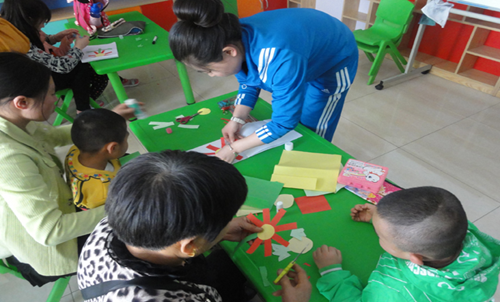Special: Giving more love to some special children
By Wang Zhen
2015-04-03
 After the Chinese government began paying more attention to autism, in 2006, there has been greater awareness of the disorder, however, many people remain pretty much unaware, while children affected early in age by the developmental disorder deserve more attention and care.According to non-government studies, at least 1 million Chinese children are affected by the disease, which has a profound effect on social interaction and the ability to lead an independent life. But, if these children could get more help early in life, they could lead quite fulfilling or even independent lives. And more experts are coming to the conclusion that early detection and intervention are necessary. So, on World Autism Awareness Day, we are asking the public to show more care to autistic children because in some ways they are not different from us, but are a little slow in developing. And we need to show more care to their families who need more support both mentally and financially. And, last but not the least, we need to pay our respect to special education teachers at autistic rehabilitation centers, who are willing to give their time and attention to these children and to teach them basic skills. | ||||
|
| ||||
|
I A personal story: "The longer you live with hopelessness, the less patience you have." A family is from Changchun, Jilin province, and the 4-year-old son, Guo Guo has autism and has spent more than a year receiving training in Beijing. He's very quiet and is often praised by strangers when he plays downstairs. But sometimes he'll suddenly laugh out loud and won't stop until you order him to.He only walks on his tiptoes. He doesn't like toys, but he can stare at car license plates for an entire afternoon. His mother talked to China Daily interviewer, "We've already spent about 100,000 yuan ($16,310). To keep costs down, we buy the cheapest food every day." "The longer you live in hopelessness, the less patience you have. I have to control my emotions in front of my son, as he is very sensitive to my tone and becomes very nervous when I raise my voice."? [Read the full story] | ||||
|
II Expert: "I believe that parents' attitudes and knowledge will help these children's futures." Peng Xinxian, a psychologist at Changchun's mental health hospital, said, on April 1, on the eve of Autism Awareness Day, "Autistic children deserve more respect and tolerance from society," then goes on to ask for families to show greater patience with them. Peng continues, "Autism is a developmental disorder that affects a person's ability to communicate and interact with others. Autistic children usually live in their own small world and are reluctant to talk to others. "But, this does not mean that they don't like touching new things and meeting new people. They just take longer to get on a normal track in life, so we need to be more patient."
Peng also emphasized the need for families bearing the strain of caring for an autistic child to adjust their mentality and get some counseling lessons. For example: Most parents feel at a loss when their kid is diagnosed with autism, and they begin to worry about whether the child will ever be self-reliant and have living skills in the future, simply because the child is different from others. Or, they may feel hopeless because they can't see any progress or maybe only a tiny amount of improvement at rehab centers or, as Peng illustrated by quoting one young mother who complained that, "My child can only say 'mama' after a half-year of rehab. This sucks." Another common scenario is that many families with autistic children, particularly those with social-status and higher incomes, see autism as a social stigma and are reluctant to talk about their child with friends or even relatives.
In response to this, Peng says that most children with autism can get onto an almost-normal life track if they get early behavioral, cognitive and speech help and they will gain some social skills and be able to lead an independent life. The expert concludes by saying, "I believe that parental attitude and knowledge will help nurture these children to a better future." | ||||
|
III Autism in China: "The scale of the challenge ahead remains unknown" When it comes to autism in China, however, specialists warn that the actual number of individuals affected by the developmental disorder, which affects communication and social interaction, is still far higher than the recorded figures. Health experts estimate that already more than 1.6 million cases have been recognized nationwide, while another 5 million-at least-are yet to be properly diagnosed. Meanwhile, autistic rehabilitation institutes have been made exempt from paying revenue tax, while the government has carried out a special plan to help impoverished parents of autistic children aged up to 6. So far 432 million yuan has been spent on helping 36,000 children born to poor families, according to official figures. China Disabled Persons' Federation data show the country has established more than 100 rehab institutions for autistic children in recent years. However, many private centers are not registered, so the actual number is likely higher.? [Read the full story] | ||||
|
IV?Not enough: Chinese government aid for autistic children The Chinese government became more aware of the disorder in 2006 and came up with an aid policy that allowed for every autistic child's family to apply for a 12,000-yuan stipend for rehabilitation, on the conditions that they obtain an official diagnosis and that the child is 3 - 6 years of age. This aid gives priority to children whose families have financial hardships. In addition, Jilin province provides financial aid to 100 autistic children aged 0-8 by providing 4,000 yuan a year for rehabilitation. Also, the city of Changchun provides 4,000 yuan for autistic children for rehab treatment. |



